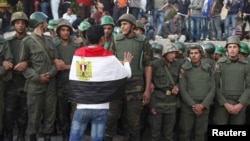Egypt's Islamist President Mohammed Morsi has ordered the military to play a more active role in securing the country days before he holds a referendum on a draft constitution denounced by liberal opposition groups.
Analysts say Egyptian generals have little desire to take Morsi's side in a growing political crisis over the controversial charter shaped by his fellow Islamists. But they also say the independent-minded military is unlikely to stand in the president's way of holding Saturday's referendum
In a decree late Sunday, Morsi gave army officers the power of arrest and instructed them to use that power to preserve national security until the results of the vote are announced.
In the days leading up to the decree, the military had limited its physical involvement in the crisis to setting up barricades around the presidential palace, where Islamist and liberal activists had engaged in deadly street battles.
Egypt's top generals also had issued a statement urging both sides to resolve political differences through dialogue and warning them that the military will not allow continued confrontation to plunge Egypt into a "catastrophe."
Staying neutral
Carnegie Middle East Center analyst Yezid Sayigh said that statement positioned the military as a neutral actor in the political crisis.
"It sent very strong signals to Morsi in particular that the army is not going to act as his proxy or as an ally in his political disagreement with the opposition in Egypt," he said. "The army also is saying we will not allow (the president) to go too far in imposing his will."
Sayigh said the military took a similar position in the February 2011 popular uprising against president Hosni Mubarak, refusing to suppress protesters to keep the longtime leader in power.
He said another reason the generals do not want to help Mr. Morsi politically is their troubled experience of governing Egypt before they handed power to him in June when he won a presidential election.
"The army as a whole was not at all happy with their political role over the past year-and-a-half after Mubarak's downfall. I believe they are very reluctant to be in that position once again."
Status secure
Sayigh, who is based in Beirut, said Egypt's military also does not need to rely on Morsi and his Muslim Brotherhood movement to protect its privileged role in society.
"Aside from the young revolutionaries who led the 2011 uprising and former presidential candidate Mohammed ElBaradei, most political parties, from so-called liberals to Salafists, would happily come to an understanding with the army that allows it to maintain its special status in the constitution."
The draft constitution facing voters on Saturday largely preserves the military's ability to run its own budget and financial interests.
Daniel Kurtzer, former U.S. ambassador to Egypt from 1998 to 2001, said those provisions are one reason why the generals are unlikely to support opposition calls for the referendum to be scrapped.
"If the military is satisfied that the constitution protects its role, I think (the generals) would give a lot of leeway to other forces within society to define the role of Islam and the questions of civil rights and the protection of human rights."
Liberal opposition groups accuse the Islamist-dominated panel that drafted the charter of ignoring their input and proposing measures that give Islam too great a role in society while ignoring women's rights. The charter's Islamist supporters say the document is an important step toward Egypt's democratic transition.
Avoiding interference
Kurtzer, a professor at Princeton University's Woodrow Wilson School of Public and International Affairs, said the Egyptian military has made a point of staying out of Morsi's way in recent months.
"One of the most interesting phenomena of the Egyptian revolution is that Mr. Morsi, as the first civilian to be elected president, has not faced the kind of potential challenge from the military that you might have seen in other countries," he said.
Sayigh said Morsi asked the military to maintain law and order because it has proved to be more cooperative with him than the police and other security services still run by Mubarak-era appointees.
"The ministry of interior's security services have been very uncooperative with the new president," he said. "They are the ones who for many years did the most to keep the Muslim Brotherhood out of parliament and out of office." The Brotherhood was officially banned under Mubarak, but it built a strong network of Islamist support through its social services.
Kurtzer said the Egyptian military's complex relationship with Mr. Morsi does not suggest a crisis is near.
"I think there is probably as much mixed feeling within the military (about the president) as there is within other sectors of society," he said.











